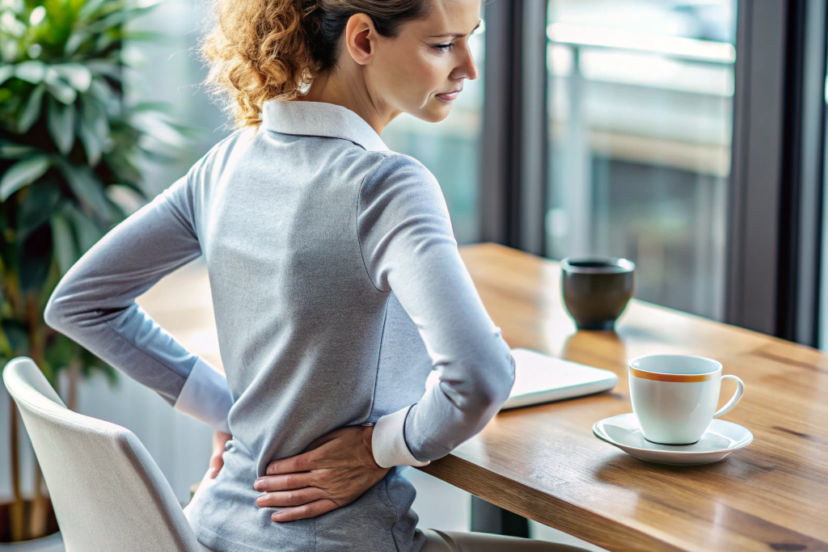Can Coffee Cause Back Pain: All You Need to Know
Coffee is one of the most popular beverages in the world, a natural stimulant that helps millions of us wake up and power through our busy lives. But could our beloved morning cup of joe be contributing to discomfort, specifically chronic back pain?
Learn the connection between coffee consumption and back pain, exploring everything from caffeine consumption to the effects on back health, stress levels, and posture. By the end of the article, you’ll have a clearer understanding of whether your cups of coffee are doing more harm than good when it comes to your back.
________________________________________
What is Chronic Back Pain?
Before we dig into the role of coffee, let’s start by understanding what we mean by chronic back pain. This is pain that lasts for three months or more and can vary in intensity, from a dull ache to sharp, debilitating discomfort. Lower back pain is one of the most common conditions, often affecting people’s ability to perform everyday activities.
The causes of back pain are varied, from poor posture to muscle tension to chronic inflammation, but many people overlook the role of diet—and particularly caffeine consumption—in triggering or exacerbating this condition.
________________________________________
Can Coffee Cause Back Pain?
So, can coffee consumption directly cause back pain? The short answer is: it depends. For some, caffeine consumption may exacerbate underlying issues related to back health, while for others, it might not have a noticeable impact. Let’s break down the potential connections.
________________________________________
Caffeine and Its Effects on the Body
Caffeine is a natural stimulant that acts on the central nervous system, helping to boost energy levels, increase alertness, and improve focus. However, it also comes with a few drawbacks, especially when excessive amounts of caffeine are consumed.
High caffeine consumption can lead to increased blood pressure, elevated cortisol levels (the body’s stress hormone), and muscle tension—all of which can contribute to back pain symptoms.
________________________________________
How Caffeine Increases Stress Levels and Affects the Body
One of the more surprising things about caffeine is how it affects the entire body. While a moderate amount can help us get through the day, too much caffeine can raise stress levels. When your body is under stress, your adrenal glands produce more cortisol, which can lead to chronic inflammation and an increase in muscle tension, both of which are key contributors to chronic pain conditions.
Increased cortisol levels may also lead to poor sleep quality, which further exacerbates chronic back pain. It’s a vicious cycle: you drink coffee to combat lack of sleep, but then your excessive caffeine intake worsens the negative effects on your back health by disrupting your sleep further.
________________________________________
The Link Between Caffeine and Muscle Tension
Have you ever felt tight and tense after a few too many cups of coffee? This could be because high caffeine intake leads to muscle tension, especially in the neck and back. When your muscles are constantly tight, they put extra pressure on the connective tissue and spinal discs, which may lead to severe pain and discomfort over time.
For individuals with chronic low back pain, caffeine may act as a trigger, amplifying pain due to the tension it causes.
________________________________________
Posture and Coffee: Are They Connected?
Another consideration is the impact of coffee on your posture. People often sip their morning cup of coffee while hunched over their computers or phones, which can lead to poor posture. Over time, poor posture can strain your back muscles and lead to lower back pain.
While coffee alone doesn’t directly cause poor posture, the way we consume it—paired with long hours sitting—certainly doesn’t help. That said, maintaining good posture throughout the day, especially while enjoying your coffee, is essential for reducing the risk of chronic back pain.
________________________________________
Caffeine and Back Pain: Scientific Insights
A study on intervertebral disc cell viability (2019) explored how caffeine consumption affects the health of the spinal discs, which play a crucial role in supporting the spine and preventing back pain. The findings suggest that high caffeine intake can interfere with the normal health of these discs, potentially accelerating degeneration, which may lead to back pain.
Other studies, like the Teratogen Update (2020), also point to how excessive caffeine intake might affect the central nervous system, leading to pain symptoms in various parts of the body, including the back.
________________________________________
The Role of Hydration and Caffeine’s Diuretic Effects
Another important factor to consider is that caffeine is a diuretic, meaning it increases urine production and can lead to dehydration. When you’re dehydrated, your muscles may become stiff and prone to muscle tension, increasing your likelihood of experiencing lower back pain.
Staying hydrated is crucial for back health because water helps to keep your spinal discs healthy and cushions your joints. If you’re a heavy coffee drinker, it’s important to balance your caffeine intake with plenty of water to avoid the negative effects of dehydration.
________________________________________
Can Coffee Worsen Existing Back Conditions?
If you already suffer from chronic low back pain, it’s possible that your caffeine habit could be worsening your symptoms. The effects of caffeine on cortisol levels, muscle tightness, and sleep disruption can create a perfect storm for individuals prone to chronic pain conditions. In these cases, it might be worth reducing your consumption of caffeine to see if your symptoms improve.
________________________________________
How Much Coffee is Too Much?

You might be wondering, how many cups of coffee are too many? For healthy adults, the FDA suggests a daily limit of about 400 mg of caffeine, which equates to around four cups of coffee. However, some individuals are more sensitive to caffeine, and even one or two caffeinated beverages may be enough to trigger symptoms like muscle tension, high blood pressure, or chronic back pain.
If you’re noticing an increase in pain symptoms after consuming coffee, it’s worth tracking your caffeine intake and seeing if reducing it leads to improvements.
________________________________________
What About Energy Drinks?
While coffee tends to get the most attention, let’s not forget about energy drinks and other caffeinated beverages. Many energy drinks contain high caffeine intake, sometimes far exceeding the amount in a typical cup of coffee. These drinks often lead to even greater spikes in cortisol levels and muscle tension, potentially worsening chronic pain.
For those who are dealing with chronic back pain, cutting back on energy drinks and opting for more anti-inflammatory foods might be a good way to support your back health.
________________________________________
The Importance of Sleep and Caffeine’s Impact
We’ve already mentioned how lack of sleep can worsen back pain, and unfortunately, caffeine can be a major culprit in disrupting sleep patterns. Even if you drink your coffee earlier in the day, its effects on the central nervous system can linger, affecting your ability to get a good night’s sleep.
Poor sleep doesn’t just leave you feeling tired—it also increases your body’s sensitivity to pain. If you’re experiencing chronic back pain, improving your sleep hygiene by cutting down on caffeine could make a significant difference.
________________________________________
Managing Back Pain Naturally
If you’re wondering how to manage your back pain while still enjoying your morning cup of coffee, here are a few tips:
- Moderation is key:
Try to limit your caffeine consumption to a moderate level—around 1-2 cups per day—and avoid excessive amounts of caffeine. - Stay hydrated:
Make sure you’re drinking enough water throughout the day to counterbalance the diuretic effects of caffeine. - Watch your posture:
Maintain good posture while sitting and standing to prevent lower back pain. - Incorporate regular exercise:
Staying active with regular exercise and stretching can help strengthen your back muscles and alleviate discomfort. - Focus on sleep quality:
If your sleep patterns are disrupted, consider cutting down on caffeine, especially in the afternoon and evening.
________________________________________
What about Decafeinated Coffee?
Decaf coffee can be a great alternative if you’re concerned about caffeine’s impact on back pain or other health issues. While decaf coffee still contains a small amount of caffeine (usually around 2-5 mg per cup compared to 95 mg in a regular cup), it’s much less likely to cause the negative effects associated with caffeine consumption, such as muscle tension, stress, and poor sleep quality.
Let’s explore how decaf coffee fits into the conversation:
________________________________________
Does Decaf Coffee Cause Back Pain?
Decaf coffee is unlikely to contribute to back pain in the same way regular coffee might, since it contains only a fraction of the caffeine. Since muscle tension and stress from caffeine are the primary culprits that could aggravate back pain, switching to decaf may alleviate those issues.
However, if you experience back pain after drinking decaf coffee, it’s possible that the problem could stem from other factors, such as poor posture, or even an unrelated digestive reaction. Bear in mind that while decaf has far less caffeine, it’s not completely caffeine-free. So, if you’re extremely sensitive to caffeine, even decaf might cause mild effects.
________________________________________
Benefits of Decaf Coffee for Back Pain Sufferers
Here’s why decaf might be a better option if you’re worried about back pain:
- Reduced muscle tension:
With minimal caffeine, decaf coffee is less likely to cause muscle stiffness or tension, which can be a factor in back pain. - Better sleep quality:
Since caffeine is known to disrupt sleep, especially when consumed later in the day, switching to decaf might help improve your sleep quality. Good sleep is essential for managing chronic pain, including back pain. - Lower stress levels:
Decaf won’t lead to the same spike in cortisol levels (stress hormone) that regular coffee can, reducing the chance of increased muscle tension and inflammation, both of which can aggravate back pain.
________________________________________
Are There Any Downsides to Decaf Coffee?
While decaf coffee offers many of the benefits of regular coffee without most of the caffeine, there are a few things to keep in mind:
- Acidity:
Decaf coffee is still acidic, which might cause some discomfort for people with certain digestive conditions, like acid reflux, which can sometimes be mistaken for back pain. If acidity is an issue, you might want to opt for low-acid coffee brands or cold brew. - Additives:
Some people experience back pain due to the additives in coffee rather than the caffeine itself. For example, sugary creamers, milk, or artificial sweeteners could contribute to inflammation or digestive issues, indirectly affecting your back.
________________________________________
Does Decaf Still Have the Same Nutritional Benefits?
Yes, decaf coffee retains most of the beneficial nutrients and antioxidants found in regular coffee, such as:
- Antioxidants:
Coffee is rich in antioxidants, which help reduce inflammation in the body. This could be beneficial for those dealing with chronic back pain, as reducing inflammation can alleviate discomfort. - Magnesium and Potassium:
These minerals found in coffee can support muscle health and reduce the risk of muscle cramps and tension, which might ease back pain.
________________________________________
Is Decaf Coffee Right for You?
If you love coffee but are concerned about its effects on your back pain, decaf coffee could be a good compromise. It allows you to enjoy the flavor and ritual of coffee without many of the potential side effects linked to high caffeine intake. For those particularly sensitive to caffeine’s effects on muscle tension or sleep, decaf could help relieve symptoms without sacrificing your coffee habit.
________________________________________
Conclusion
So, can coffee cause back pain? The answer isn’t black and white. While coffee consumption alone may not directly cause chronic back pain, it can certainly contribute to discomfort if you have underlying causes like muscle tension, poor posture, or lack of sleep. Reducing your caffeine habit might be worth a try if you’re dealing with chronic pain conditions, and making other lifestyle changes—like staying hydrated, exercising, and focusing on sleep—will go a long way in supporting your back health.
At the end of the day, coffee isn’t the enemy—it’s all about balance.
Switching to decaf coffee may be a smart move if you think caffeine is contributing to your back pain. With much less caffeine, decaf is unlikely to cause the muscle tension, stress, or poor sleep that can worsen chronic pain. However, if you still experience discomfort, consider looking into other factors like posture, acidity, or additives in your coffee routine.
Remember, listening to your body is key—if decaf feels better, it might be the best option for managing your back pain.
________________________________________
Explore related articles:
- How to Relieve Back Pain Fast at Home: Your Go-To Guide
- 25 Scientific Health Benefits of Turkish Coffee
- Is it okay to drink decaf coffee at night? Benefits Explored
- Is Coffee Keto? What You Need to Know
- Can Coffee Cause Dizziness? 10 Ways to Avoid It
- Does Coffee Cake Have Caffeine? Recipe Inside
FAQs
1. Can drinking coffee make your back hurt?
Yes, for some people, the caffeine in coffee can contribute to muscle tension, which may lead to back pain.
2. What foods trigger back pain?
Fatty foods, alcohol consumption, and foods that increase inflammation may exacerbate chronic pain conditions like back pain.
3. Why am I in pain when I drink coffee?
If you experience pain after drinking coffee, it could be due to the effects of caffeine on muscle tension, stress levels, or poor sleep quality.
4. Can caffeine cause muscle and joint pain?
Yes, much caffeine can lead to muscle tension, which may result in joint pain or muscle discomfort.
5. What are symptoms of too much caffeine?
Symptoms of excessive caffeine intake include headaches, muscle tension, jitteriness, high blood pressure, and sleep disturbances.
6. Can coffee cause nerve pain?
High caffeine consumption can potentially irritate nerves and increase sensitivity to nerve pain, although more research is needed in this area.
7. What stops nerve pain immediately?
Over-the-counter pain relievers, rest, and sometimes physical therapy can help provide immediate relief from nerve pain.
8. Can caffeine trigger pain?
Yes, high caffeine intake can trigger pain symptoms due to increased muscle tension, dehydration, and elevated cortisol levels.




